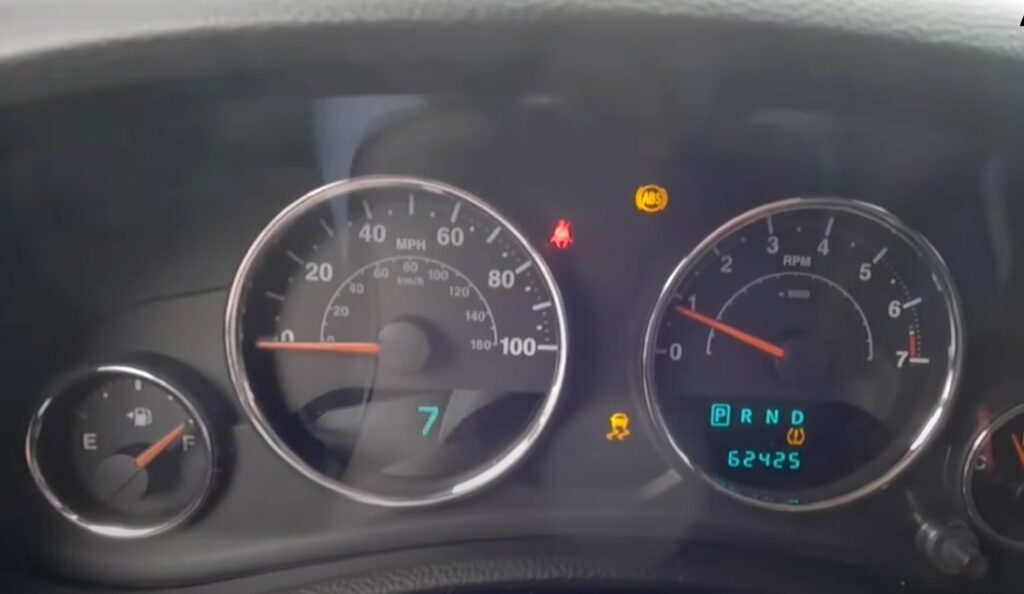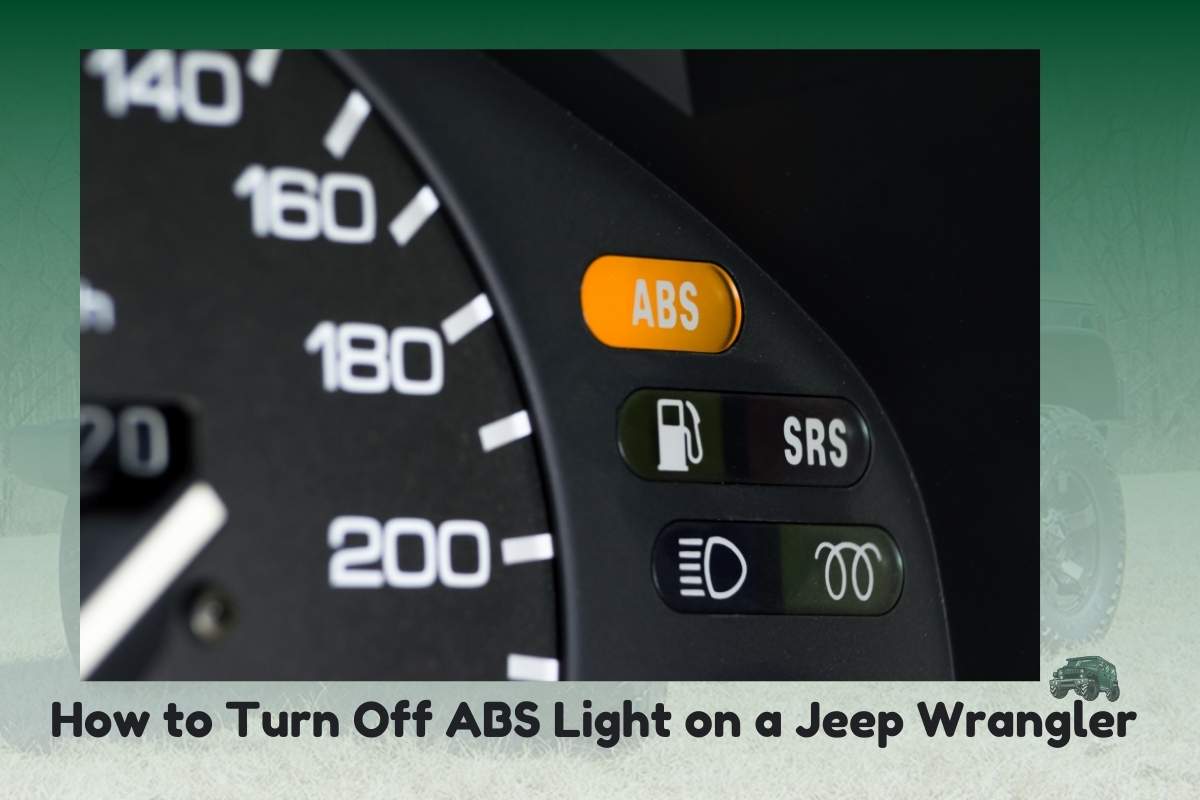How to Turn Off ABS Light on a Jeep Wrangler
An anti-lock braking system (ABS) is a good thing for your Jeep if you frequently travel in wet or snowy weather. Thus, your ABS light is on means the system probably has a problem, and your anti-lock brakes may not work.
So, how to turn off the ABS light on a Jeep Wrangler? You can turn that off by taking out the two ABS circuits within the PDC. The power distribution center is located on the front fender of the battery. You can remove the OLED panel and pull the bulb if you’re just trying to get rid of the light.
Besides, as ABS malfunction may result from several issues, you must do more than just switch off the light. Stay till the end of the article to learn about the ABS Light malfunction on a Jeep Wrangler.
Table of Contents
Some Reasons Why the ABS Light May Be On
There are various reasons which can cause the ABS light to stay on. Take a look at the following reasons and solutions for the ABS light staying on.
Low Brake Fluid
A brake operates as a hydraulic device that depends on hydrostatic fluid, so sufficient friction can only be achieved when the brake pad level is high.
The ABS module monitors the fluid levels and alerts you if they drop too low. Hence, a red caution light will frequently be present to signal this. Worn brake pads might also reduce the level of braking fluid.
Failure of the Wheel Speed Sensor
The ABS central controller needs continual data from the wheels to determine which wheel is about to slide. Each wheel has a speed sensor, also known as an ABS sensor, wheel sensor, or motion detector, which monitors how quickly the wheels rotate.
If malfunctioning, it won’t inform the ABS module of a wheel’s relative speed to the other tires. In response, the ABS module is unsure whether it should exert more or less force on that particular wheel.
However, the speed sensor’s damaged wire may be the cause of this. A speedometer that is unreliable or inconsistent is a common warning indication. The ABS light will turn on as a result of this defect.
If you are sure that the sensor is operating correctly, reset the dashboard light and check the connections. Corroded or broken cables and connectors are potential issues with speed sensors.
A healthy ABS tire velocity monitor can give incorrect readings if there are problems with the wheel bearing, the wheel size, or the tire pressure.
Defective ABS Module
Even though they are rarely defective, if an ABS control module malfunctions, you can notice odd ticking sounds or unpredictable braking where you encounter no or excessive resistance.
Sometimes a fault code can be used to diagnose this, but more often than not, you’ll need to stop using all of the sensors that feed the module. The ABS alert light will turn on as a result.
Accordingly, which detector is triggering the ABS to flash should be revealed by the issue code. In modern automobiles, the unit, pump, and hydraulic adjuster are all integrated into one unit. It would be a costly repair if you wanted to upgrade the entire device.
Examine the control module; occasionally, rust or filth can prevent the module from speaking to the system as a whole.
Damaged ABS Pump
The mechanical ABS pump is the brain of the anti-lock braking system. The car shouldn’t be driven if there is a significant issue.
The vehicle cannot be stopped because a failing pump motor cannot efficiently circulate the brake fluid required to apply the brakes. Thus, a failed ABS pump motor will manifest as a harsh or excessively soft parking brake and a less sensitive handbrake. This will also cause the ABS light to turn red.
Blasted Fuse
Given that the ABS module and detectors are electrical devices, the ABS light may illuminate as a result of a blown fuse. Fuses protect the circuits, and a blown ABS fuse may indicate a short circuit.
The precise position of your car’s fuse panel can be found via the instruction booklet or a quick Internet search. Based on where the driver’s seat is, the location could change.
Check the wiring, particularly the sections leading to the speed sensors. Use the included fuse puller to renew the ABS fuse if it is not damaged. Turn off the ABS light after replacing the ABS fuse.
If the fuse burns once more, you should have the car checked out by an electronics professional. Examine the sensors if the panel light reappears.

How to Turn Off ABS Light on a Jeep Wrangler?
You may avoid having your Jeep Wrangler’s ABS warning light turn on by taking these measures.
- Keep the brakes clear of dirt and debris first.
- Second, be sure to always verify the brake liquid pressure and add more if necessary.
- Third, have a professional mechanic check the brakes annually.
Keeping your Jeep Wrangler’s ABS light off is as easy as implementing these strategies.
How To Reset The ABS light
To reset the PCM/ECM, follow the following steps:
- Remove the positive battery connection as a first step.
- And then press the brake pedal for a few seconds to deplete the car’s electrical system.
- Get the power back on by reconnecting the positive cable.
If this doesn’t permanently reset the light, it should be out for a week. If the warning light persists after you’ve completed step 1,
- Verify for scratched ABS detectors as the second step.
- And then replace them by removing the wire connector from the wheel hub and disassembling the casing.
After you’ve finished this, you should restart the system.
If the light is still on after you’ve tried the first and second steps, you may attach an OBDII scanner to your car’s monitoring system to determine the source of the problem. Keep in mind that the brake warning light might be signaling the need to replace or repair anything else on the vehicle.
FAQs
As the ABS light on a Jeep Wrangler can be a complicated topic, take a look at these frequently asked questions for further clarity.
If I pull the plug on the battery, would it turn off the ABS warning?
The ABS warning light may be turned off if the car’s battery is unplugged for a long time.
So why isn’t my ABS warning light coming on?
Apparently, there was a malfunction in the ABS system. A defective battery or the anti-lock brake system (ABS) might cause a voltage drop, which would cause the car to stall intermittently. No matter what you do, it will remain and will require a reset.
My Jeep’s ABS light is on; am I allowed to drive it?
Jeeps include an ABS to keep the tires from locking up under heavy braking. When an issue is detected by the ABS system, the warning light will illuminate.
Driving with the ABS warning light on is dangerous since it reduces braking efficiency and lengthens tractive effort. Driving with the ABS warning light on requires gentle pumping of the brakes to prevent the locking of the tires.
Conclusion
The anti-lock braking system (ABS) is a crucial safety feature. A careful approach is required if you choose to operate with the anti-lock flashing light on rather than activated.
In the event that your brake hazard bulb is on and you experience very little braking force, you should have your brakes examined promptly. We hope that after reading this you will feel prepared to troubleshoot, fix, and effectively reset the ABS warning light.







